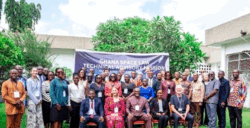Madam Louisa Iris Arde, Municipal Chief Executive (MCE) for Jomoro in the Western Region, has urged farmers, to add value to their produce by refining to be able to export to the international market.
She pointed out that produce from farms – such coconut, palm nut, fish, cassava and pepper – in the Nzema area, if refined, will open up the economy, expand the market base for the youth as well as curb the rural-urban migration.
“A lot of the youth are moving to the urban centres, searching for non-existing jobs; but if we are able to all add value to what we produce, nobody will move from his or her comfort zone to move to a place where he will be sleeping on the street,” she added.
Madam Arde was speaking at a sensitisation workshop organised by the Ghana Export Promotion Authourity (GEPA) for the three Nzema districts – Ellembelle, Jomoro and Nzema East. The workshop aimed at promoting agriculture value chain in the area of coconut, palm produce, fish farming, cassava production, among others for further assistance.
The MCE noted that the level of bureaucracy at some agencies for business support kills the spirit of initiative in the private sector.
“If you go for support, registration of products or services, they would ask you to bring this document, bring a counterfeit of this, come with a photocopy of that, and when it continues and continues it becomes very difficult because moving from the Nzema area to Accra is not a small journey, and when nothing happens, people would want to coil into their shelves and would not do anything,” she explained.
“But when the farmer does not get the needed support in the value addition of produce from the farm, it becomes very frustrating,” she added. She further urged agencies and stakeholders in the sector to take a second look at bureaucracies that do not ensure growth of businesses in the country.
Madam Ursla Tawiah, Western and Western North Regions Zonal Officer of GEPA, speaking on the National Export Development Strategy (NEDS), explained that NEDS provides a clear vision of the desired evolution of Ghana’s non-traditional export sector 10 years from now, and a roadmap for attaining the vision.
She said forging a national consensus on how best to approach industrial export development is the best for the benefit of all Ghanaians. She encouraged the farmers to know more about the produce they are dealing with so they can be supported at the export level.
Alexander Dadzawa, Director in charge of Project at GEPA, said NED has a target of achieving US$25.3billion on Non-Traditional Export (NTE) by the year 2029.
“The African Continental Free Trade Area (AfCFTA), since its implementation in 2021 with the objective to increase our Intra-African Trade, is progressing steadily, so let us do our best so we can increase trade among African countries,” he said.
Emil Tawiah Atsu, District Coordinating Director of Ellembelle, also noted that value addition to raw materials would help the local economy to grow.










